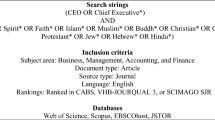Abstract
The aim of this study is to explore the influence of religious beliefs on the work-related attitudes of Turkish SME (small and medium-sized enterprise) owner-managers. In this research, the emergence of pious or devout business people is considered as a phenomenon, and special attention is paid to religious transformation and secularism in Turkey. Both concepts, religion and secularism, are considered within the Turkish context. For the research, in-depth interviews were conducted with 32 Turkish business people from religious and secular backgrounds, respectively. The study investigates the so-called “Islamic work ethic” values and Islamic business principles from a critical perspective and argues that they do not seem to be as significant factors as predicted in the emergence of pious or devout business people in Turkey.
Similar content being viewed by others
References
Abel, T. and W. C. Cockerham: 1993, Lifestyle or Lebensfuhrung? Critical Remarks on the Mistranslation of Weber’s “Class, Status, Party”, The Sociological Quarterly, 34, (3), 551–556.
Ali, A.: 1988, Scaling an Islamic Work Ethic, The Journal of Social Psychology, 128 (5), 575–583.
Arslan, M.: 1999, Cross-Cultural Comparison of the Work Ethic of the Protestant, Catholic and Muslim Managers, Unpublished PhD Thesis (University of Leeds).
Arslan, M.: 2000, A Cross Cultural Comparison of British and Turkish Managers in Terms of PWE Characteristics, Business Ethics: A European Review, 9 (1), 13–19.
Arslan, M.: 2001, The Work Ethic Values of Protestant British, Catholic Irish and Muslim Turkish Managers, Journal of Business Ethics, 31(4), 321–339.
Asad, T.: 1993, Genealogies of Religion-Disciplines and reasons of power in Christianity and Islam, The Johns Hopkins University Press: London.
Bryman, A. and E. Bell: 2003, Business Research Methods, Oxford University Press: New York.
Bugra, A.: 1994, State and Business in Modern Turkey: A Comparative Study, SUNY Press: New York.
Bulut, F.: 1997, Tarikat Sermayesinin Yukselisi (the Booming of the Tarikat Capital), Oteki Yayinlari: Istanbul.
Carkoglu, A and B. Toprak: 2006, Degisen Turkiye’de Din Toplum ve Siyaset (Religion, Society and Politics in the Changing Turkey), TESEV: Istanbul.
Dogan, A. E.: 2006, Islamci Sermayenin Gelisme Dinamikleri ve 28 Subat Sureci (The Dynamics of Islamic Capital and the period of February 28th), Mulkiye, 252.
Furnham, A.: 1984, The Protestant Work Ethic: A Review of the Psychological Literature, European Journal of Social Psychology, 14(1), 87–104.
Furnham, A.: 1990, The Protestant Work Ethic: The Psychology of Work-Related Beliefs and Behaviours, Routledge: London.
Giddens, A.: 1984, The Constitution of Society, Polity: Cambridge.
Gokalp, Z.: 1973, Terbiyenin Sosyal ve kulturel temelleri (Social and cultural Foundations of Ethics), Milli Egitim Basimevi: Istanbul.
Hennis, W.: 2000, Max Weber’s Central Question, Threshold Press: Newbury, Berks.
Jones, H. B.: 1997, The Protestant Ethic: Weber’s Model and the Empirical Literature, Human Relations, 50(7), 757–778.
Kuran, T,: 1993, The Economic Impact of Islamic Fundamentalism, in M. Marty and R. S. Appleby (eds.), Fundamentalism and the State, Chicago University Press: Chicago, pp. 302–341.
Marshall, G.: 1982, In Search of the Spirit of Capitalism: An Essay on Max Weber’s Protestant Ethic Thesis, Columbia University Press: New York.
Martin, D.: 1978, A General Theory of Secularization, Basil Blackwell: Oxford.
Mawdudi, S. A.: 1947/1987, The Economic Problem of Man and Its Islamic Solution (Islamic Publications, Lahor).
Miller, P. F. and W. T. Coady: 1984. Vocational ethics: Toward the development of an enabling work ethic, Illinois State Board of Education: Springfield.
Niles, F. S.: 1999, Toward a Cross-Cultural Understanding of Work-Related Beliefs, Human Relations, 52(7), 855–867.
Ozcan, G. B. and M. Cokgezen: 2003, Limits to Alternative Forms of Capitalization: The Case of Anatolian Holding Companies, World Development, 31(12), 2061–2084.
Ozdalga, E.: 2003, Secularizing Trends in Fethullah Gulen’s Movement: Impasse or Opportunity for Further Renewal?, Critique: Critical Middle Eastern Studies, 12 (1), 61–73.
Ozdemir, S.: 2006, MUSIAD: Anadolu Sermayesinin Donusumu ve Turk Modernlesmesinin Derinlesmesi (Musiad: The Transformation of Anatolian Capital and the Deepening of Turkish Modernity), Vadi: Ankara.
Qutb, S.: 1948, Social Justice in Islam, Translated by J. D. Hardie (American Council of Learned Societies, New York).
Schluchter, W.: 1981, The Rise of Western Rationalism: Weber’s Developmental History, University of California Press: London.
Turkdogan, O.: 2002, Islami Degerler Sistemi ve Max Weber (Islamic Value System and Max Weber), IQ Yayincilik: Istanbul.
Turner, B. S.: 1974, Weber and Islam: A Critical Study, Routledge & Kegan Paul Ltd: London.
Ulgener, F. S.: 1991, Iktisadi Cozulmenin Ahlak ve Zihniyet Dunyasi (Ethics and the Mentality of the Economic Disintegration Era) (Der Yayinlari, Istanbul).
Ulgener, F. S.: 2006, Zihniyet ve Din – Islam, Tasavvuf ve Cozulme Devri Iktisat Ahlaki, (Mentality and Religion: Islam, Sufism and the Economic Ethic of the Disintegration Period), Der Yayinlari: Istanbul.
Weber, M.: 1978, Economy and Society Vol I–II, University of California Press: California.
Weber, M.: 2004, The Protestant Ethic and the Spirit of Capitalism, Routledge: London.
Yousef, D. A.: 2001, Islamic Work Ethic: A moderator between organizational commitment and job satisfaction in a cross-cultural context, Personnel Review, 30(2), 152–169.
Author information
Authors and Affiliations
Corresponding author
Rights and permissions
About this article
Cite this article
Uygur, S. The Islamic Work Ethic and the Emergence of Turkish SME Owner-Managers. J Bus Ethics 88, 211–225 (2009). https://doi.org/10.1007/s10551-009-0107-z
Published:
Issue Date:
DOI: https://doi.org/10.1007/s10551-009-0107-z




